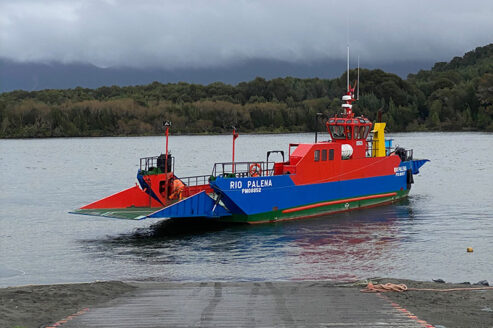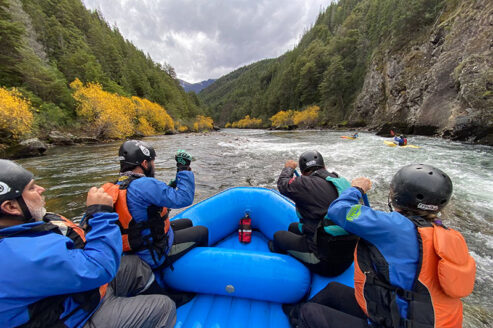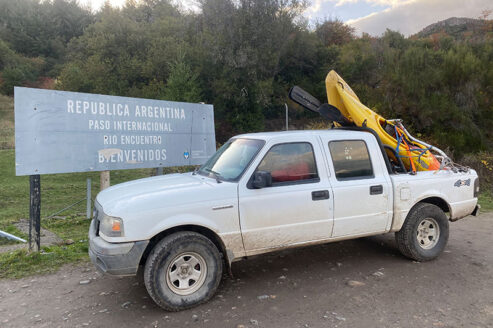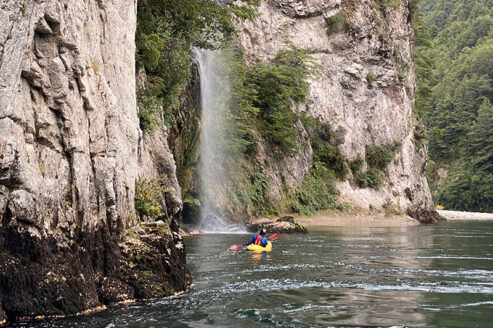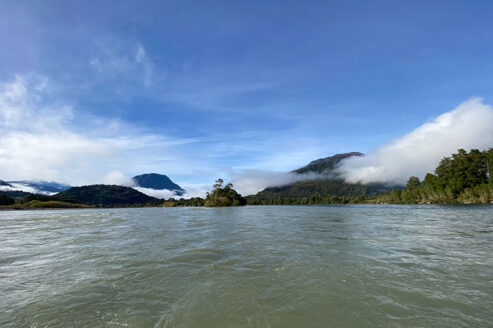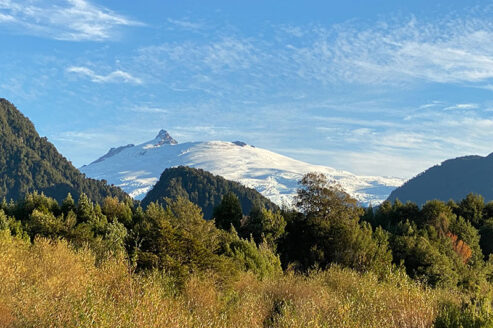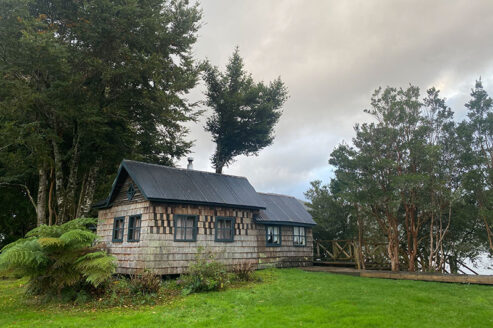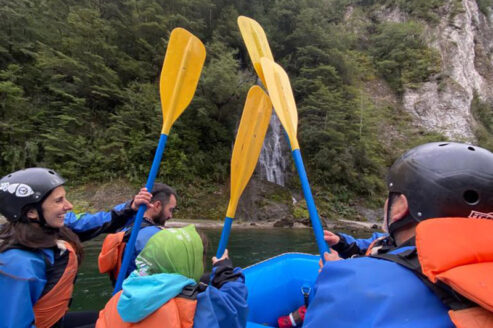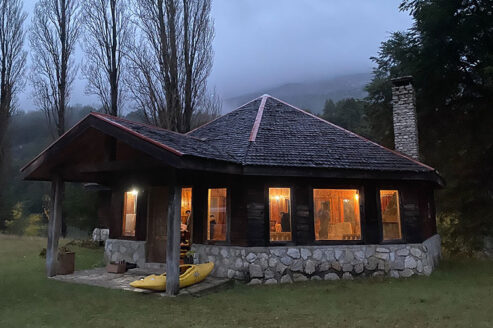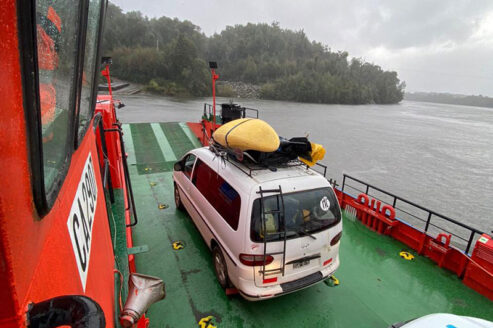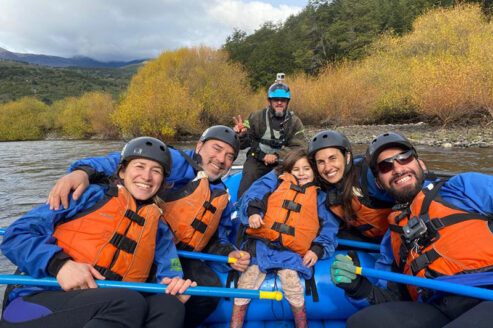![]() Duration:
Duration:
7 days/6 nights
 Difficulty:
Difficulty:
Medium/High
![]() Departures:
Departures:
Nov/Dec/Feb/Mar
The proposal is to cross the Andes mountain range on a raft until reaching the Pacific, traveling along the Río Corcovado basin. A nice challenge with a variety of landscapes and plenty of emotion.
The basin of the Corcovado river is bi-national, and ends into the Pacific Ocean; after crossing the frontier, the river changes its name to Palena. It is born in Argentina, at the eastern end of Wintter (or Winter) lake. Its higher section has a curved shape in the mountain territory of Chubut, passing by the towns of Corcovado and Carrenleufú, to then delve into Chile, until it ends into the Pacific ocean in the Golfo del Corcovado gulf. It was one of the rivers of interest when the border with Chile was defined, between criteria regarding high summits and ridgelines or watersheds.
From the water, you can see the transition of the steppe into the mountain ecosystems. Then, when you enter Chile, the landscape surrounds you with the thick Valdivian forest, its mountains, volcanoes, and waterfalls, until you reach the Pacific ocean. There are high possibilities of spotting native wildlife and also introduced species.
The expedition starts at the town of Corcovado, Argentina, and ends at Raúl Marín Balmaceda, Chile, on the coast by the Pacific Ocean. In all, around 300 km are traveled, out of which 40 km have class 3 and 4 rapids. These kilometers require team work, physical and mental strength to manage the raft. And adrenaline to be enjoyed, which will provide many anecdotes to share at the end of each day. The rest of the circuit is quiet waters, which allows you to rest and relax.
Day 1: CORCOVADO
Meeting in the Esquel area in the afternoon. Transfer from Esquel (Hotel or Airport) to Corcovado (90 km, 2 hours). After checking in at the cabins, we will prepare for the welcome talk, which will explain the details of the expedition and the daily dynamics.
Night at Corcovado.
Rooms in cabins on a single, double, triple, or quadruple base. 1 bathroom per cabin.
Meals: dinner.
Day 2: CORCOVADO-CARRENLEFÚ
In the morning, you will receive your gear, and a technical and safety talk before going to the water. Navigation begins at the “Puente de los aplausos” bridge. The first section crosses a landscape of a forested plateau, in quiet waters. During this stretch, there will be a chance of spotting wildlife and recognizing the native forest species, while the crew gets used to how the raft is maneuvered, and practices the paddling and safety techniques.
River waters speed up as we get closer to the mountain range, and class II and III rapids appear. A fair adrenaline dose for the first day in the river. Lunch is planned to take place at El Arenal beach, and then navigation continues to Carrenleufú. Dinner will be at a shelter, where we will spend the night by the river banks.
Night at Carrenleufú: In a shelter with an equipped kitchen, a log hearth, a bathroom (without shower), and one room holding 10 guests, where we will sleep in a sleeping bag with an insulation mat. Tents can be set up if necessary.
Meals: Breakfast, picnic, tea-time snack, dinner.
Navigation: 40 km approximately.
Day 3: THE FRONTIER
In a vehicle, the group will travel to the Río Encuentro pass to clear Immigration and Customs. Then we’ll go back to the river from another field, where access will be by vehicle up to a certain point, and the rest of the way (500 meters approximately) we will walk, with a negative level difference.
From the Frontier, the day’s navigation will start up to Estancia Rincón Chico. Lunch is planned at the “curved bridge.” Once at the estancia, we’ll have dinner in the quincho.
Night at Rincón Chico: In a wild camping site, without bathroom or shower. A cooking tent.
Meals: Breakfast, picnic, snacks, dinner.
Navigation: 40 km approximately.
Day 4: PIEDRAS NEGRAS
Navigation towards the Paraje Piedras Negras spot. Wild camping (land logistics to set up the tents and have dinner).
Night at Piedras Negras: In a wild camping site, without bathroom or shower. A cooking tent.
Meals: Breakfast, picnic, snacks, dinner.
Navigation: 60 km approximately.
Day 5: PUERTO BONITO
This day, we’ll navigate towards Los Sauces beach, where the logistics team will have our lunch ready. Then all the camping gear and the food will be loaded onto the raft, to continue our circuit and camp at Puerto Bonito, where there is no access for vehicles. Most of our luggage will remain in the vehicle, and we will retrieve it the next day.
Night at Puerto Bonito: In a wild camping site, without bathroom or shower. A cooking tent.
Meals: Breakfast, picnic, snacks, dinner.
Navigation: 70 km approximately.
Day 6: THE PACIFIC
Last navigation day towards our final target: the Pacific Ocean. Lunch is planned at Raúl Martín Balmaceda. Then navigation continues up to Fundo Los Leones, where the expedition members will be awaited with the farewell dinner.
Night at Fundo Los Leones: Rooms (single, double, triple, or quadruple base) with a private bathroom.
Meals: Breakfast, lunch, snacks, dinner.
Navigation: 50 km approximately.
Day 7: ESQUEL
After a good breakfast, the land transfer back to Argentina starts. At 2 km from Fundo, the Palena river is crossed on a barge, to continue by road up to the frontier to clear Immigration. From there, it is 26 km (40 minutes) up to Corcovado, where a stop is planned in order to have lunch and pick our luggage. After that, the last 90/112 km are traveled up to Esquel (hotel or airport).
Meals: Breakfast and lunch.
Land transfer: 289 km in 6 hours, with lunch time included.
THE CIRCUIT: see in this link the planned stops in this program.
IT INCLUDES:
- Land transfer from Esquel to Corcovado.
- Land transfer from Fundo Los Leones (Chile) to Esquel.
- 2 nights’ accommodation, and 4 nights in wild camping.
- Meals: 6 breakfasts, 6 lunches, 6 tea-time snacks, and 6 dinners.
- Non-alcoholic beverages.
- Civil liability and personal accidents insurance.
Camping gear
- Tents for 2 or 3 passengers.
- Cooking items (cups, plates, cutlery).
Safety
- Technical gear: Neoprene suit; semi-dry jacket; life vest; neoprene boots and gloves; 35-liter water-tight bag (to place personal items).
- Logistic support on land.
- Safety kayak.
- Inreach (satellite communication).
- First-aid kit.
It does not include:
- Flight to and from Esquel.
- Last night in Esquel (optional).
- Sleeping bag and insulation mat.
- Personal hygiene items.
- Expenses caused by quitting the expedition.
- Traveler assistance.
Restrictions:
Due to the characteristics of the trek, the following are not eligible to participate:
People who are obese. If the participant weighs 110 kg or more and is less than 180 cm tall.
People with blood pressure consistently above 140/90.
People with a history of heart disease. People with central or peripheral cardiovascular disease, diminished cardiac or vascular capacity, or who use stents, bypasses, pacemakers, or other prostheses.
Pregnant women.
People who suffer from seizures (epilepsy).
People with ADD.
People who have a limitation or loss of their physical, intellectual, or sensory abilities.
People who suffer from diseases caused by respiratory disabilities such as COPD, asthma, emphysema, among others.
- DESCRIPTION
The proposal is to cross the Andes mountain range on a raft until reaching the Pacific, traveling along the Río Corcovado basin. A nice challenge with a variety of landscapes and plenty of emotion.
The basin of the Corcovado river is bi-national, and ends into the Pacific Ocean; after crossing the frontier, the river changes its name to Palena. It is born in Argentina, at the eastern end of Wintter (or Winter) lake. Its higher section has a curved shape in the mountain territory of Chubut, passing by the towns of Corcovado and Carrenleufú, to then delve into Chile, until it ends into the Pacific ocean in the Golfo del Corcovado gulf. It was one of the rivers of interest when the border with Chile was defined, between criteria regarding high summits and ridgelines or watersheds.
From the water, you can see the transition of the steppe into the mountain ecosystems. Then, when you enter Chile, the landscape surrounds you with the thick Valdivian forest, its mountains, volcanoes, and waterfalls, until you reach the Pacific ocean. There are high possibilities of spotting native wildlife and also introduced species.
The expedition starts at the town of Corcovado, Argentina, and ends at Raúl Marín Balmaceda, Chile, on the coast by the Pacific Ocean. In all, around 300 km are traveled, out of which 40 km have class 3 and 4 rapids. These kilometers require team work, physical and mental strength to manage the raft. And adrenaline to be enjoyed, which will provide many anecdotes to share at the end of each day. The rest of the circuit is quiet waters, which allows you to rest and relax.
- ITINERARY
Day 1: CORCOVADO
Meeting in the Esquel area in the afternoon. Transfer from Esquel (Hotel or Airport) to Corcovado (90 km, 2 hours). After checking in at the cabins, we will prepare for the welcome talk, which will explain the details of the expedition and the daily dynamics.
Night at Corcovado.
Rooms in cabins on a single, double, triple, or quadruple base. 1 bathroom per cabin.
Meals: dinner.
Day 2: CORCOVADO-CARRENLEFÚ
In the morning, you will receive your gear, and a technical and safety talk before going to the water. Navigation begins at the “Puente de los aplausos” bridge. The first section crosses a landscape of a forested plateau, in quiet waters. During this stretch, there will be a chance of spotting wildlife and recognizing the native forest species, while the crew gets used to how the raft is maneuvered, and practices the paddling and safety techniques.
River waters speed up as we get closer to the mountain range, and class II and III rapids appear. A fair adrenaline dose for the first day in the river. Lunch is planned to take place at El Arenal beach, and then navigation continues to Carrenleufú. Dinner will be at a shelter, where we will spend the night by the river banks.
Night at Carrenleufú: In a shelter with an equipped kitchen, a log hearth, a bathroom (without shower), and one room holding 10 guests, where we will sleep in a sleeping bag with an insulation mat. Tents can be set up if necessary.
Meals: Breakfast, picnic, tea-time snack, dinner.
Navigation: 40 km approximately.
Day 3: THE FRONTIER
In a vehicle, the group will travel to the Río Encuentro pass to clear Immigration and Customs. Then we’ll go back to the river from another field, where access will be by vehicle up to a certain point, and the rest of the way (500 meters approximately) we will walk, with a negative level difference.
From the Frontier, the day’s navigation will start up to Estancia Rincón Chico. Lunch is planned at the “curved bridge.” Once at the estancia, we’ll have dinner in the quincho.
Night at Rincón Chico: In a wild camping site, without bathroom or shower. A cooking tent.
Meals: Breakfast, picnic, snacks, dinner.
Navigation: 40 km approximately.
Day 4: PIEDRAS NEGRAS
Navigation towards the Paraje Piedras Negras spot. Wild camping (land logistics to set up the tents and have dinner).
Night at Piedras Negras: In a wild camping site, without bathroom or shower. A cooking tent.
Meals: Breakfast, picnic, snacks, dinner.
Navigation: 60 km approximately.
Day 5: PUERTO BONITO
This day, we’ll navigate towards Los Sauces beach, where the logistics team will have our lunch ready. Then all the camping gear and the food will be loaded onto the raft, to continue our circuit and camp at Puerto Bonito, where there is no access for vehicles. Most of our luggage will remain in the vehicle, and we will retrieve it the next day.
Night at Puerto Bonito: In a wild camping site, without bathroom or shower. A cooking tent.
Meals: Breakfast, picnic, snacks, dinner.
Navigation: 70 km approximately.
Day 6: THE PACIFIC
Last navigation day towards our final target: the Pacific Ocean. Lunch is planned at Raúl Martín Balmaceda. Then navigation continues up to Fundo Los Leones, where the expedition members will be awaited with the farewell dinner.
Night at Fundo Los Leones: Rooms (single, double, triple, or quadruple base) with a private bathroom.
Meals: Breakfast, lunch, snacks, dinner.
Navigation: 50 km approximately.
Day 7: ESQUEL
After a good breakfast, the land transfer back to Argentina starts. At 2 km from Fundo, the Palena river is crossed on a barge, to continue by road up to the frontier to clear Immigration. From there, it is 26 km (40 minutes) up to Corcovado, where a stop is planned in order to have lunch and pick our luggage. After that, the last 90/112 km are traveled up to Esquel (hotel or airport).
Meals: Breakfast and lunch.
Land transfer: 289 km in 6 hours, with lunch time included.
THE CIRCUIT: see in this link the planned stops in this program.
- INCLUDED/NOT INCLUDED
IT INCLUDES:
- Land transfer from Esquel to Corcovado.
- Land transfer from Fundo Los Leones (Chile) to Esquel.
- 2 nights’ accommodation, and 4 nights in wild camping.
- Meals: 6 breakfasts, 6 lunches, 6 tea-time snacks, and 6 dinners.
- Non-alcoholic beverages.
- Civil liability and personal accidents insurance.
Camping gear
- Tents for 2 or 3 passengers.
- Cooking items (cups, plates, cutlery).
Safety
- Technical gear: Neoprene suit; semi-dry jacket; life vest; neoprene boots and gloves; 35-liter water-tight bag (to place personal items).
- Logistic support on land.
- Safety kayak.
- Inreach (satellite communication).
- First-aid kit.
It does not include:
- Flight to and from Esquel.
- Last night in Esquel (optional).
- Sleeping bag and insulation mat.
- Personal hygiene items.
- Expenses caused by quitting the expedition.
- Traveler assistance.
- RECOMENDATIONS
Restrictions:
Due to the characteristics of the trek, the following are not eligible to participate:
People who are obese. If the participant weighs 110 kg or more and is less than 180 cm tall.
People with blood pressure consistently above 140/90.
People with a history of heart disease. People with central or peripheral cardiovascular disease, diminished cardiac or vascular capacity, or who use stents, bypasses, pacemakers, or other prostheses.
Pregnant women.
People who suffer from seizures (epilepsy).
People with ADD.
People who have a limitation or loss of their physical, intellectual, or sensory abilities.
People who suffer from diseases caused by respiratory disabilities such as COPD, asthma, emphysema, among others.
MAKE YOUR RESERVATION
Next departure dates:
October 01st to 07th 2025.
Inquire about private departures, alternative dates, and shorter programs.

